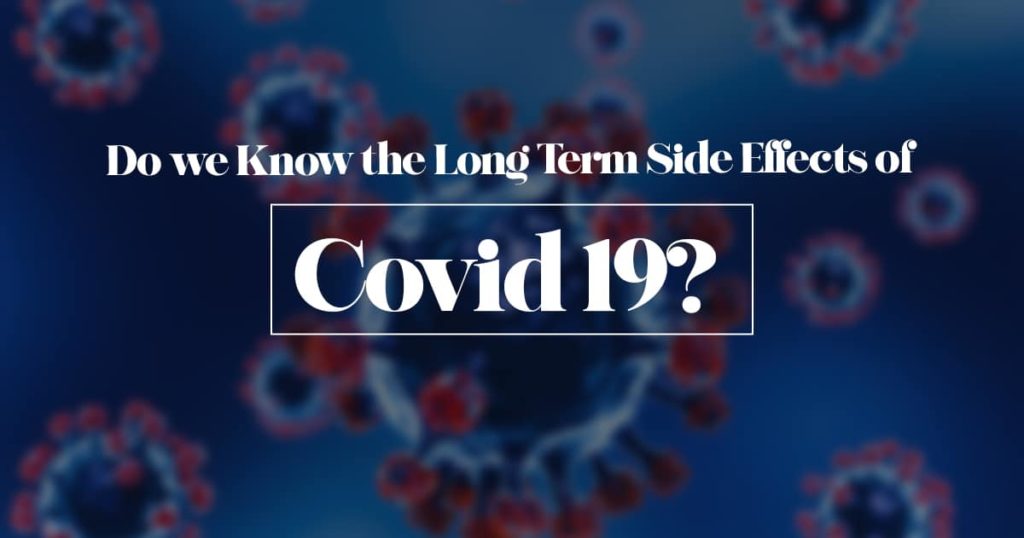The coronavirus, SARS-COV-2– the virus that causes Covid 19, was discovered in December 2019. Researchers are learning more about its long-term effects and how the coronavirus affects different people in various ways after infection with the full illness itself. Some people who have seemed to recover from Covid 19 after an average of two weeks experience longer-lasting damage to their organs and other lingering symptoms. This is being called “long Covid,” and those infected are referred to as Covid 19 “long haulers.” “Long Covid” or “post-Covid syndrome” may be informing us of the long-term effects of Covid-19 and contributing to what we are learning about coronavirus anxiety.
Usually, Covid 19 lasts about two weeks for most people. Still, doctors commonly see patients returning to treatment who are reporting lingering damage to certain organs in the body or showing signs of cognitive impairment like brain fog, headache, and trouble concentrating. Even after testing negative for this illness caused by the coronavirus, anxiety has abounded by the way a recovered patient can still feel shortness of breath, lack of taste and sense of smell, fatigue, and even mental health problems like depression and anxiety. Not only may there be pervasive and ongoing damage, but there are also issues affecting the mental health of those patients who have gone through grief and loss over the death of loved ones and trauma associated with being hospitalized.
Long Term Effects of Covid-19
Johns Hopkins Medicine has reported long-term Covid symptoms, which show its possible lingering effects, including:
- Breathing issues – problems in the lungs involve scarring in the lungs and mild infections that lead to shortness of breath
- Heart problems – inflammation of the heart muscle, felt and remaining after the 2-week illness has ended. It can produce shortness of breath, heart palpitations, and rapid heartbeat.
- Kidney damage – dangers of long-term kidney disease can affect those who incurred kidney damage while infected.
- Lost sense of smell and taste – a difference in how things taste and the lack of scent has been reported to linger long after testing negative; this can lead to a lack of appetite, depression, and anxiety.
- Neurological problems – brain fog, fatigue, headaches, and dizziness
- Nervous system symptoms – also affecting mental health due to the trauma of hospitalization and anxiety associated with possible Post Traumatic Stress Disorder, along with difficulties concentrating and sleeping.
- Mental Health Issues – stress from isolation and major life changes like loss of economic security, loss of loved ones, change in health. Loss of control and delirium from stays in the Intensive Care Unit.
Mental Health Center of San Diego
How Long Can the Effects of Covid-19 Last?
The answer is as of yet unknown. With the continual spread and long-standing infection rate of Covid 19, the Delta variant, and lately of the Omicron strain, coronavirus anxiety is becoming considered another hazard in the wake of the prevalence of this pandemic. This leaves us uncertain as to how long it will take for a person to recover individually and for the collective rate fully. Effective treatment during these uncertain times involves physical recovery, continued monitoring, and treatment combining mental health interventions and medical.
The Center for Disease Control (CDC) says post-Covid effects can take four or more weeks and range in various ways with different outcomes in recovery. Post-Covid symptoms, or the long term effects of Covid-19 being felt currently range with these various symptoms:
- Fatigue
- Shortness of breath
- Difficulty concentrating
- Headache
- Cough
- Sleep problems
- Dizziness
- Coronavirus anxiety
- Mood changes
- Fever
….among many others, including:
- Inflammation of the organs (heart, lungs, kidneys, skin, and brain)
- Mental illness (isolation, trauma)
Mental Health Center of San Diego
Are You Feeling Coronavirus Anxiety?
A currently identified host of mental health issues has recently been coined “coronavirus anxiety.” If you are experiencing stress, fear, and worry related to coronavirus, there are ways you can relieve the feelings you may be having from being on edge all the time during the pandemic. Here are a few tips to help you regulate anxiety and have your focus work for you in healthier ways:
- Focus on what you can control– while the pandemic rages, peaks, and ebbs, do what you can to keep your life going as normally as possible. Stay safe and focus on adapting to the necessary changes.
- Don’t always check the latest news– obsessively checking the latest scary news about the pandemic can churn up more fear for you than is necessary.
- Stick to the prevention practices, like wearing a face mask– keep following the safety guidance from trusted sources like the CDC.
- Try to get more sleep– it is understandable to experience more insomnia lately, but getting more sleep is worth it for strengthening your immune system.
- Make a plan– if you or a loved one should get sick, know what you can do to get the proper treatment.
- Continue to practice safety protocols– social distancing, avoiding crowds, and washing your hands frequently.
- Stay connected to loved ones through other means like social media
- Do not engage in fearful emotional conversations too frequently
The last few years of the pandemic have been extremely challenging for all of us. As we progress through this time of change and transition, we are learning more and more about the long-standing impacts this illness will have on our futures. Though none of us are truly alone in this challenge, many of us can’t escape feeling high uncertainty as to what to do next. In this time, we are really seeing how the mind and bodywork as a whole unit when facing the long-term effects of Covid-19. So should the strength of your mental health and the shape of your physical body as you stay aware and informed.
If you or someone you love are experiencing coronavirus anxiety or dealing with mental struggles from the long-term effects of covid-19 contact the Mental Health Center of San Diego at (858) 258-9883 to learn more about treatment options in the San Diego area today.









